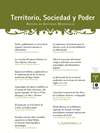Abstract
Resumen: El recurso a la toponimia como fuente para la historia medieval ha estado presente en buena parte de la historiografía europea, especialmente en relación con los estudios sobre el poblamiento altomedieval.
En este artículo hacemos hincapié en las posibilidades que la toponimia ofrece para comprender la gestación de la territorialidad de la aldea feudal en ámbitos como los montañosos, en los que el sistema toponímico ha sufrido escasas modificaciones.
Palabras clave: toponimia, arqueología, aldea feudal, historia rural.
Abstract: Toponimy as a source of knowledge about early Middle Age world has been present in xx century European historiography. It has been specially used in order to mitigate the lack of archaeological evidence that could yield data about the population process that lead to feudal villages. However, the dramatic increase in archaeological excavations in recent times has evidenced the deficiencies of the interpretations based on toponimical registers. The number of archaeological sites multiplied and, in most cases, there was not a correspondence between a place-name and its belonging to a historical period and the data offered by archaeology. Because of this, the role of place-names in the analysis of early medieval population process has been toned down, what has in turn lead to the questioning of toponymy as a source of historical knowledge.
However, this criticism has not been accompanied by a deeper understanding of the importance of toponymy in order to understand other processes, like the gradual configuration of the territory of feudal villages. The suggestion of this paper to reflect and study in depth the meaning of toponymy as expression of the awareness a given group has about their territory, and as mirror image of the economic and social changes taking place within the community in feudal villages. Some examples show that if we compare toponimy, especially in mountain areas, with information from written sources, it can offer relevant information about rural history: Places and systems used in farming, appropriation and use of land and the social differences brought about by these changes. To sum up, by analysing and interpreting the meaning of toponymy, we can understand the social organisation of territory.
Keywords: toponymy, archaeology, feudal village, rural history.

